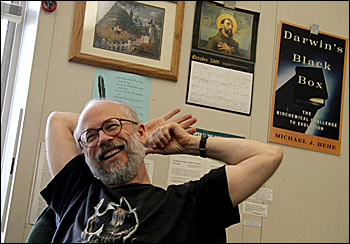 |
 |
 |
 | |||
|
Dover, PA. So what is intelligent design? And where's the science behind it?
"Evolution is a word that carries many different meanings, and you've got to be careful to tease them apart," said Behe. "One meaning is simply change over time. That in the past there were dinosaurs and different things. You know, that's fine. Nobody disputes change over time. Another meaning of the word is common descent, that organisms today are descended physically from ones of the past. That's cool too, you know. Intelligent design has nothing to say about that. What intelligent design does focus on is the third meaning of Darwin's theory of evolution and that is that Darwin proposed that there were random changes in organisms, and that some changes could help and that they could be favored by something called natural selection. Intelligent design essentially argues that what we see was not the result of random mutation and natural selection but rather of purposeful activity." Michael Behe is the author of one of the first books to bring some scientific heft to the intelligent design movement while reaching a mass audience, a book called Darwin's Black Box: The Biochemical Challenge to Evolution. Behe's book has sold more than 200,000 copies, but he says his argument would never have seen the light of day if he tried to publish it in professional journals, where scientific ideas are generally advanced. "You'll get a lot of scientists who will stand up and say, 'Sure we don't know how the complexity of the cell evolved,'" says Behe. "They'll say, ... 'We don't have the foggiest idea how life started, where the first cell came from.' But if you want to get somebody to stand up and say, 'I think the complexity of the cell points to design,' then the number [of scientists] goes down to me." He laughs and adds, "And a couple others." Even his own colleagues in the biology department at Lehigh have put a disclaimer on their Web site saying that the department unequivocally supports evolutionary theory with Behe as the sole dissenter. In fact, the book that drew Michael Behe into the intelligent design movement, Darwin on Trial, was not written by a fellow scientist but by a lawyer, Phillip Johnson. "Even the simplest forms of life that we know are extremely complex," says Johnson, a professor emeritus of law at the University of California at Berkeley. "Any single cell is, in fact, a masterpiece of miniaturized complexity that makes a spaceship or a supercomputer look relatively low-tech in comparison. How did the enormous amount of biological information that is required to operate these complex mechanisms come into existence?" When asked who the "designer" is to him, Johnson responds, "I would say, personally, that if there is an intelligent designer, I would say the most likely candidate is God." Always the lawyer, Johnson is quick to say it's just his opinion, that God is the intelligent designer. Scientific writings and position papers on intelligent design, or ID, make no mention of the identity of the designer.
Continue to part 3 | |||||
 | |||||
